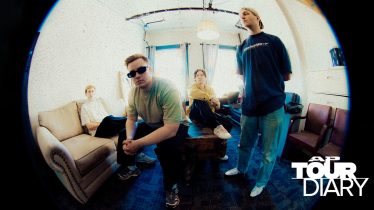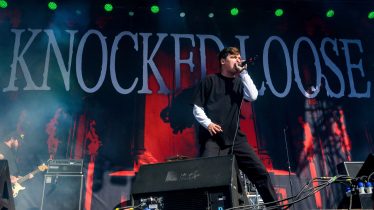
Cold Waves Festival jumpstarts the fury of industrial-rock
[Pictured: Chris Connelly of Revolting Cocks: Big Sexy Land; Photo by: Bobby Talamine]
It started out as a tribute to a friend. Jamie Duffy was a bona fide underground-rock fixture in the Chicago club scene, a highly regarded musician and talented sound engineer who always gave his best to make any band he was working with sound their best. It didn’t matter if it was a national touring act or a half-assed cover band playing jock jams in a sports bar, farting their way through “Eye Of The Tiger”: Duffy made bands sound better than they ever should have. In the studio, he engineered records by industrial avatars Ministry, hip-hop royalty Method Man and many electronic rock acts. As a player, Duffy was a staple in the city’s industrial-rock scene, as a guitarist in electro-metal contenders Acumen Nation, as well as his drum-and-bass project DJ? Acucrack. He was dedicated to a life in music, and his abilities were always exalted by those artists he worked with.
Read more: Enter Shikari’s Rou Reynolds opens up on mental health struggles

[Pictured: Jamie Duffy]
On June 21, 2012, Jamie Duffy had taken his life. That familiar face who was ready to help and apply his expertise to anyone who needed it would no longer grace the Chicago club scene.
After that tragic day, the city’s electronic-rock community took action. Jason Novak, a close friend and bandmate who played with Duffy in Acumen Nation, put together a tribute show, dubbed Cold Waves, featuring musicians Duffy worked with, as well as other bands in that scene, with proceeds marked to help Duffy’s family pay off funeral expenses. The event, located at the 700-capacity Bottom Lounge, was a sell-out and was a fitting tribute to both Duffy and the bands he touched with his skill. The success of the event brought about an atmosphere of goodwill within that industrial-rock community that had been significantly on the wane. It was decided that the spirit of community that came to celebrate Duffy should be a recurring event in Chicago.

[Pictured: Wes Eisold; Photo by: Miguel Escobar]
Now in its sixth year, Cold Waves has created another agenda, gradually creating a zeitgeist of its own, teaming up respected electronic/industrial veterans alongside a generation of newcomers. At this year’s Chicago event (spread across three nights at the city’s venerable Metro club this past September), next-gen psychedelic electro-gloom act Drab Majesty, hard circuit-driven Canadians iVardensphere and synth-driven post-punks Cold Cave (led by American Nightmare frontman Wes Eisold) held court—and fans’ attention spans—alongside ‘90s outfits such as Stabbing Westward, KMFDM and hometown boys Cyanotic. Likewise, deep underground heroes like Australia’s Severed Heads and Berlin’s Pankow threw down their respective strains of twitching electronic flourishes and huge noise-metal beats before the arrival of ohGr, the solo project of Nivek Ogre, the charismatic frontman of industrial avatars Skinny Puppy. (Most current AP readers know him as the Ghost Rider in the final season of the MTV series Teen Wolf.) All in attendance were pleasantly surprised to see a space where new-school enthusiasts rubbed Doc Martens alongside grizzled, elder rivetheads.
“The lineage of industrial music and the way the sound has splintered off from its origin has been so influential to my music,” Cold Cave’s Eisold says. “From Throbbing Gristle to Ministry and Nine Inch Nails, to the golden era of Wax Trax! and to the harsher, more avant industrial noise like Grey Wolves, Ramleh, Con-Dom and Genocide Organ, I find industrial music to be deeply personal and boundless in sound, a reflection of the current world through sampling, technology and the body within those. It pre dates punk and was more punk than punk in sound and its DIY approach.”

[Pictured: Youth Code; Photo by: Teddie S. Taylor]
“In the last five years, I’ve seen industrial begin to seep back into people’s awareness,” says Sara Taylor, vocalist for Youth Code whose appearance at the 2014 CW event made heads swivel. “My feelings as to why it’s coming back is because it was such a powerful sound. You had the explosion of synthesizers in the ’70s and ’80s becoming a big part of the music back then, but nobody was really being aggressive with it. The times we’re living in now, aggression is something people embrace every day. People are listening to harder metal, and even dubstep can get abrasive from time to time. Now industrial looks like it’s getting its day in the sun again. It’s been 30 years and like everything else, it’s cool again. And I think it’s great.”
“The times we’re living in now, aggression is something people embrace every day.”
In the ’80s to mid-90s, Chicago was the industrial rock capital of America. This was single handedly due to Jim Nash and Dannie Flesher, the men behind Wax Trax! Records, the pioneering electronic-rock label that was born from the record store of the same name. The imprint is inextricably linked to Al Jourgensen, the driven mastermind of Ministry, his vehicle for chameleonic bouts of dance rock, pop flirtations, noise generating and tungsten-forging metal. Jourgensen helped build the foundation, and Nash and Flesher populated their rhythm-and-noise clubhouse with like-minded Europeans (KMFDM, Front 242, Meat Beat Manifesto, the Young Gods among many) and local Chicago maniacs (My Life With The Thrill Kill Kult), as well as any side project or ad hoc collaboration Jourgensen created. It was a remarkable time of synthesizers, samplers and studio monitors blowing up, guitars being tortured, the occasional motorcycle ride in a studio drum room, as well as stories of excess that would make stegosauruses like Aerosmith cringe.
But the genre’s major enduring acts weren’t from Chicago at all: Rob Zombie sampled and looped his way into arena gigs, while Rammstein hailed from Berlin to make bank. Industrial rock’s largest cultural—and commercial—force remains Nine Inch Nails, the vehicle for Cleveland transplant (and massive WT! fan) Trent Reznor, who put a human veneer on the genre and became the fulcrum for anyone wanting to explore powerful songs with abrasive electronics. Outside of those acts, the genre stayed small and underground. Despite being the American flashpoint for the genre, Ministry only garnered one Platinum album (1992’s Psalm 69) and major labels were bankrolling a fair share of opportunists who were rarely inspiring. By 1993, Wax Trax! had ceased operations due to bankruptcy; Nash had passed away in 1995, and Flesher succumbed in 2010. The aesthetic the duo supported carried on in various levels of potency, but by that time, the true believers accustomed to Ministry, NIN and Rob Zombie walked away and went further underground to discover new thrills, from digital hardcore, intelligent dance music, Japanese noise or the jittery output of Warp label artists like Aphex Twin and Squarepusher.
“It seemed major labels poached elements of that music and turned the genre into something that was a little cookie-cutter,” Cold Waves founder Novak posits about the genre’s original shelf life. “Fans of the culture reacted to that by shrinking away from it and going further underground and keeping it really small in order to protect it. They weren’t going to participate in it being sold out. I think people became disenfranchised from the people who were trying to make new heavy electronic/industrial music: It wasn’t interesting, it could be directly traced to other bands as imitations, and people got annoyed with it. [Major-label bands] would write the songs and then put the electronics on top of it, as opposed to finding the harsh sounds to inspire heaviness.”
As Cold Waves came together as a tribute to Duffy, a renewed interest in the genre became apparent. Later generations who weren’t even born when such classics as the Revolting Cocks’ “Stainless Steel Providers” or Thrill Kill Kult’s “A Daisy Chain 4 Satan” were staples on college radio and rock clubs, found ecstasy in the incendiary machine beats, girder-hammering guitars and random electronic noise. Looking back at a selection of Wax Trax! releases will unearth sonic madness that was way ahead of its time.

[Pictured: Stabbing Westward; Photo by: Bobby Talamine]
Read more: Foo Fighters urge mental health awareness: “Depression is a disease”
“There’s no word of mouth,” continues Paul Barker about the new rivethead awareness. As a former member of i-rock avatars Ministry and other associated projects, he’s more than qualified to reflect on the current milieu of electronic-rock fans. “One person finds out, then a whole bunch more do. The response to the music was far less immediate back in the days when we were making it. And more underground. I think that made the music a lot more precious as a consequence, because you had that clubhouse mentality about it.”
With the consecutive successes of the Chicago-based event behind him, Novak has created Cold Waves LA, a two-night event at the Regent Theater where members of the old guard (Stabbing Westward, proto-dubstep pioneers Meat Beat Manifesto, bona fide rivetheads Front Line Assembly, Ascension Of The Watchers featuring Burton C. Bell of Fear Factory, Cubanate, 16Volt, MC 900 Ft. Jesus) will throw down the gauntlet alongside next-gen acts such as Kanga, Boy Harsher and Not Breathing. Cold Waves LA’s big highlight is Revolting Cocks: Big Sexy Land, a reunion of some of the artists who helped create 1986’s legendary studio project, Big Sexy Land. Although Jourgensen has severed all ties with the group (hence the name incorporating the LP title in an effort to distance the players from litigation), Belgian members Luc Van Acker and Front 242 frontman Richard 23 never toured America together in a RevCo lineup. For the Nov. 11 event, they’ll be joined by bassist Barker, Novak on guitar, former RevCo/Ministry vocalist/solo artist Chris Connelly and drummer Dan Brill playing that album, as well as selections from the follow-up LP, Beers, Steers And Queers.
Both old-schoolers and next-gen listeners will be treated to an added bonus during Cold Waves LA, at the Montalban Theater tonight, where a special screening of Industrial Accident: The Untold Story Of Wax Trax! Records, a documentary film surrounding the pioneering label’s history, along with the subculture (and characters) it had fostered.
Julia Nash, daughter of label co-founder Jim Nash, has organized a preview showing along with a Q&A session. “It was so much work to incorporate all that history into a 90-minute film,” Nash says. “One thing that comes up frequently in the movie was how so many artists referred to my dad and Dannie as family. ‘They were like my parents’ [is a comment] that kept recurring throughout the interviews. But really, we could’ve made a movie based on just the fans, alone. Wax Trax! fans are some of the greatest out there. They are loyal, kind and just awesome. Young fans came up to me at Cold Waves and told me how much they appreciated what my father and Dannie did, wishing they were around when the label was in full swing. It’s a really good feeling.”
It’s important to stress that Novak and his associates aren’t trying to sell industrial as a rigid aesthetic with proscribed signifiers. The way he sees it, the event is not just friends and old-schoolers participating in an orgy of back-slapping. It’s about the possibilities where electronic-based rock of all creative, challenging stripes can intersect to an audience of open-minded people who love the cocktail of smoldering synths and six-stringed savagery. Electronic rock is one big sea, but plenty of creative tributaries are flowing into it.
“I think that’s our point,” Novak says. “To carve something out that is a little more about music than it is a preconceived notion of industrial. What I always end up getting sucked into is a conversation about the fashion or the ‘scene.’ There are a bunch of bands I could list right now that people would think are obvious choices to play Cold Waves. That would be disingenuous, as we’re trying to get people who are doing different things that don’t feel they have to look a certain way or dress a certain way. We’re trying to take chances like putting a noise band on or a more romantic new wave band. If you can make a connection to the kind of music that we all love, we’re pretty open to it.”
“We’re trying to get people who are doing different things that don’t feel they have to look a certain way or dress a certain way.”
“It’s certainly about tributaries,” Barker agrees. “There are certain bands that are completely retro-sounding—I guess that’s popular today. I don’t know how people are accessing this music. All the headlining bands [at Cold Waves] are from that late-‘80s, early-‘90s era, but half the crowd was older and the other half were younger. That’s wonderful that kids are into the shit; there is something there. I don’t want to be curmudgeonly about it. After a period of time, the term ‘industrial rock’ is no longer offensive because it points to a subculture that people want to embrace. Now, it seems everybody is caught up to speed historically, but it’s still not popular by today’s standards. And it’s grown in legend.
“I’m not a sentimental guy,” Barker continues. “A lot of these bands that have been around a while make you feel like you’re going to see a diorama at a museum. But there are people who simply love that music, and that’s good enough for them.”
Duffy would be proud that all of this resurgence in a much-maligned community started as a gesture of respect to everything he stood for. Novak knows that, too, which is why he’s setting up the non-profit charity Darkest Before Dawn, to benefit suicide prevention and mental health initiatives for bartenders, sound engineers, stage managers and other people who work in nightlife service. (“That community of workers are responsible for every single great night you’ve ever had. You leave, and they have to clean up.”) It’s in that spirit that Novak always keeps his late friend in his heart.
“Jamie respected artists and musicians almost more than he enjoyed their music, to tell you the truth,” Novak says. “That’s why so many people dropped everything to come celebrate him and mourn his passing. He would do anything to keep musicians afloat, to keep them sounding good, to keep them happy. He’d never ask for any payment. He was a kind of a unicorn. We want to celebrate him, as well as pushing this music forward—in whatever form it might take.”
A limited amount of tickets for Cold Waves LA (Nov. 10-11) are still available.
Editor's note: We updated the date for the screening of Industrial Accident: The Untold Story Of Wax Trax! Records. The event takes place Thurs., Nov. 9, not Wed., Nov. 8, as previously reported. If you're in LA and reading this, go.







